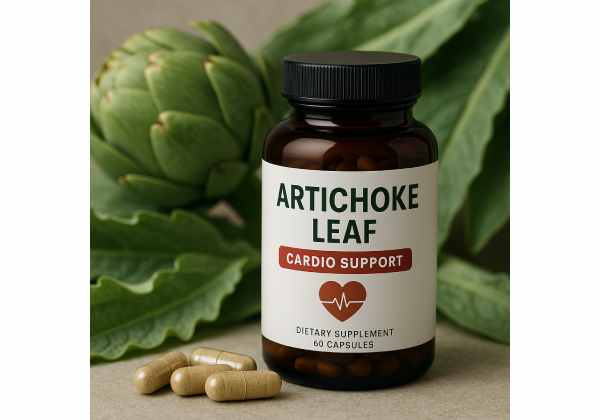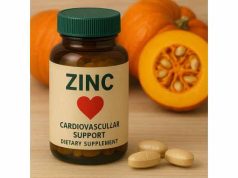
Artichoke leaf, derived from the perennial thistle-like plant Cynara scolymus, has drawn increasing scientific and popular attention for its contributions to heart wellness and overall cardiovascular function. Recognized for promoting healthy cholesterol levels, supporting arterial integrity, and curbing oxidative stress, artichoke leaf for Heart Health has emerged as a prominent supplement option. While artichokes are widely consumed as a nutritious vegetable, it is the leaf’s potent phytochemicals that offer many of the cardioprotective advantages. This article dives into the core attributes of artichoke leaf, explains how it acts in the body, reviews scientific data highlighting its cardiovascular value, and clarifies the best methods to integrate it into daily health routines.
Table of Contents
- Comprehensive Profile: Key Traits and Components of Artichoke Leaf
- Mechanisms of Action: How Artichoke Leaf Operates
- Clinically Established Cardiovascular Gains with Artichoke Leaf
- Optimal Dosage, Practical Use, and Safety Guidelines
- Artichoke Leaf FAQ: Common Inquiries and Direct Responses
- References and Research Materials
Comprehensive Profile: Key Traits and Components of Artichoke Leaf
Artichoke leaf is prized for a concentrated set of nutrients and phytochemical compounds. Although the globe artichoke is typically enjoyed in cuisines worldwide, the leaves remain comparatively underexplored by casual consumers. Historically, herbalists have valued the leaf for its robust antioxidant makeup, ability to stimulate bile flow, and potential to safeguard cardiovascular health. Let us look at the essential characteristics that distinguish artichoke leaf from many other herbal supplements.
Historical Roots and Culinary Crossovers
Hailing originally from the Mediterranean region, artichoke plants have been cultivated for thousands of years. Ancient Greeks and Romans recognized their therapeutic possibilities, employing artichoke leaf for digestive ailments and liver support. Over time, its usage expanded into various cultural and medicinal traditions, leading to an array of culinary preparations. Nevertheless, the heightened interest in artichoke leaf for Cardiovascular Health is more recent, propelled by modern research confirming its synergy with heart-protective strategies.
Notable Phytochemicals
Artichoke leaf houses several bioactive substances. Key elements include:
- Cynarin: Often credited for influencing cholesterol metabolism and stimulating bile secretion.
- Chlorogenic Acid: A potent antioxidant also found in coffee beans, recognized for attenuating oxidative stress and aiding in blood sugar management.
- Luteolin: A flavonoid believed to curb inflammation and bolster nitric oxide levels, thereby assisting blood vessel dilation.
- Apigenin: Another antioxidant and anti-inflammatory compound that helps reduce free radicals linked with chronic disease onset.
These compounds—often in synergy—offer a framework for explaining artichoke leaf Benefits for Heart Health. By tackling inflammation, high cholesterol levels, and oxidative injury, they create a broad defensive line for the cardiovascular system.
Essential Nutrients and Additional Attributes
While artichoke leaf primarily stands out for its phytochemicals, it also features smaller amounts of beneficial nutrients:
- Minerals: Magnesium, calcium, and potassium help sustain balanced electrolytes, crucial for normal cardiac rhythms.
- Dietary Fiber: Some artichoke leaf formulations, especially in powdered form, offer modest fiber content that can further aid digestion and cholesterol excretion.
In addition, the bitter profile characteristic of artichoke leaf is not merely a flavor signature—it often indicates bioactive compounds. Bitterness is commonly associated with heightened liver function and improved fat breakdown, key elements in controlling lipid levels in the bloodstream.
Market Availability and Varied Preparations
Artichoke leaf supplements appear in multiple formats to accommodate different preferences:
- Standardized Extracts: Often in capsule or tablet forms, offering precisely measured cynarin or related compound levels.
- Liquid Tinctures: Allow for flexible dosage and quicker absorption, but can have a strong bitter taste.
- Powdered Form: Can be integrated into teas, smoothies, or homemade herbal blends for a more hands-on approach.
Each format offers unique advantages. Standardized extracts may assure users of consistent potency, while powders or tinctures permit more customization based on personal tolerance or health objectives.
Relevance in Modern Holistic Health
Beyond digestive support, the broad-spectrum value of artichoke leaf for Vascular Support continues to earn attention. Its ability to lower LDL (“bad”) cholesterol, improve endothelial function, and contribute to overall metabolic harmony aligns well with modern integrative health philosophies that emphasize preventive measures. Given that heart disease remains a global concern, incorporating a supplement that systematically addresses multiple cardiovascular risk factors can be an intelligent choice. This synergy is also relevant for individuals combining artichoke leaf with other heart-focused supplements or prescriptions for a more comprehensive cardioprotective plan.
By surveying these characteristics—ranging from its historical usage and prime active constituents to the format in which it is commonly found—one gains a robust appreciation of artichoke leaf’s multifaceted potential. However, deeper insights into how these compounds function in the body shed further light on why this herb stands out among natural strategies for heart disease prevention. The next section explains the distinct mechanisms that drive its cardioprotective and metabolic advantages.
Mechanisms of Action: How Artichoke Leaf Operates
Artichoke leaf extends beyond a single benefit, interacting with the body through numerous biochemical pathways to safeguard and reinforce cardiovascular function. Examining how these compounds modulate metabolism, inflammatory processes, and circulatory parameters underscores the multifaceted approach behind artichoke leaf Helps Cardiovascular Function.
Bile Flow Enhancement and Cholesterol Metabolism
Cynarin, a signature compound in artichoke leaf, is credited with boosting bile production and release from the liver. Bile is integral to the digestion and absorption of fats, including cholesterol. Elevated bile flow can:
- Facilitate Fat Breakdown: Improved lipid digestion often translates to enhanced fat clearance from the circulatory system.
- Promote LDL Reduction: Through increased bile excretion, the body disposes of surplus cholesterol, potentially lowering LDL levels over time.
- Support Liver Performance: A well-functioning liver is essential for balancing cholesterol production and recycling, further aiding in cholesterol homeostasis.
Antioxidant Defense and Free Radical Neutralization
Artichoke leaf is replete with antioxidative flavonoids like luteolin and apigenin, along with polyphenols such as chlorogenic acid. These substances:
- Scavenge Reactive Oxygen Species (ROS): By eliminating free radicals, they protect blood vessels and heart tissues from oxidative damage.
- Preserve Endothelial Health: Reduced oxidative stress safeguards the inner lining of arteries, encouraging elasticity and preventing early plaque formation.
- Amplify Endogenous Antioxidants: In certain cases, artichoke leaf compounds can modulate the activity of natural antioxidant enzymes, offering an internal boost against ongoing oxidative challenges.
Anti-inflammatory Effects and Vascular Stability
Low-level, chronic inflammation often correlates with a heightened risk of plaque buildup and arterial stiffness. By tempering inflammatory processes, artichoke leaf:
- Regulates Pro-inflammatory Cytokines: Reducing levels of molecules like TNF-α and IL-6 lowers the inflammatory cascade often implicated in cardiac ailments.
- Encourages Smooth Arterial Walls: Diminished inflammation helps maintain supple blood vessels, assisting in normal circulation and reduced stress on the heart.
Nitric Oxide Facilitation and Blood Pressure Control
Nitric oxide (NO) is a critical vasodilator involved in maintaining healthy blood pressure and arterial function:
- Enhanced NO Bioavailability: Key flavonoids in artichoke leaf appear to maintain or even heighten NO levels, resulting in better vasodilation and improved blood flow.
- Blood Pressure Support: Through healthy vasodilation, the heart exerts less pressure to circulate blood, which may help individuals at risk for hypertension.
Glycemic Modulation and Metabolic Balance
Though often overshadowed by its lipid-related benefits, artichoke leaf also exerts mild but notable effects on carbohydrate metabolism:
- Carbohydrate Absorption: Certain polyphenols in the leaf may slightly reduce the absorption rate of carbohydrates, contributing to more consistent blood sugar levels.
- Insulin Sensitivity: There are indications of improved insulin sensitivity in some studies, potentially lessening metabolic strain on the cardiovascular system.
- Weight Management Synergy: Healthier glycemic control and the leaf’s natural bitterness (promoting satiety) might collectively support moderate weight loss or stable weight, indirectly reducing cardiac stress.
Liver-Centric Protective Role
A healthy liver is pivotal for regulating cholesterol and detoxification:
- Hepatoprotective Properties: Artichoke leaf may shield liver cells from oxidative or toxic insults, reinforcing the organ’s efficiency in controlling lipid and glucose metabolism.
- Integral to Cardiovascular Resilience: When the liver efficiently handles fat and detoxification, the burden on the cardiovascular system diminishes, promoting comprehensive heart wellness.
Broader Impact on Stress and Inflammation
Chronic stress increases cardiovascular risk factors like hypertension, arrhythmias, and poor lipid profiles. While not as deeply researched, anecdotal evidence and some preliminary data hint that artichoke leaf’s adaptogenic-like properties could mildly assist with stress responses, providing secondary support to heart function.
Holistic Integration with Lifestyle
Each mechanism described above forms a piece of artichoke leaf’s overall potential. In a real-world context, these benefits amplify when coupled with:
- Nutrient-Dense Diet: Balanced meals bolstering the leaf’s capability to manage lipids and inflammatory levels.
- Physical Activity: Regular exercise to improve circulation and weight management.
- Stress Management: Meditation, yoga, or other relaxation techniques that alleviate tension on the heart.
- Supplement Synergy: Complementing artichoke leaf with additional botanicals, vitamins, or minerals that further nurture cardiac health.
Hence, the cumulative effect is more significant than any one isolated pathway. While cynarin, luteolin, and other compounds each have separate roles, they converge to create a robust protective network. The subsequent section spotlights scientific and clinical evidence that confirms artichoke leaf’s place among top-tier natural interventions for cardiovascular well-being.
Clinically Established Cardiovascular Gains with Artichoke Leaf
Given the variety of physiological actions exerted by artichoke leaf, researchers and healthcare professionals have taken keen interest in its cardiovascular implications. A growing body of studies aims to clarify exactly how artichoke leaf for Vascular Support can mitigate common cardiac risk factors and bolster long-term heart wellness.
Research on Cholesterol and Lipid Management
1. LDL and Total Cholesterol Reduction
- Clinical Trials: Multiple randomized trials investigating artichoke leaf extract found that participants consistently showed significant dips in LDL and total cholesterol, often without major lifestyle changes beyond supplementation.
- Mechanistic Basis: Improved bile flow and potential downregulation of cholesterol synthesis collectively result in LDL clearance.
2. HDL Enhancement
- Importance of HDL: High-density lipoprotein scours the bloodstream for excess cholesterol and transports it to the liver for removal, functioning as a protective factor against atherosclerosis.
- Observations: Some studies indicate modest but real improvements in HDL levels among individuals who incorporate artichoke leaf into daily regimens, enhancing the total cholesterol ratio.
3. Triglyceride Moderation
- Relevance: Elevated triglycerides further complicate cardiovascular disease risk, especially in the presence of insulin resistance.
- Evidence Base: Preliminary investigations hint that artichoke leaf’s impact on fat digestion and metabolic function extends to stabilizing triglycerides, although more detailed research is warranted.
Blood Pressure and Circulatory Performance
1. Systolic/Diastolic Decreases
- Clinical Findings: Some controlled interventions note small yet meaningful reductions in both systolic and diastolic blood pressure among subjects with mild hypertension.
- Plausible Explanations: Heightened nitric oxide availability, anti-inflammatory effects, and better lipid profiles synergize to ease arterial tension, contributing to stabilized blood pressure figures.
2. Arterial Elasticity and Flow-Mediated Dilation (FMD)
- Significance of FMD: A standard measure of endothelial health, FMD gauges how readily arteries dilate in response to blood flow.
- Study Outcomes: Patients with borderline cardiovascular risk who supplemented with artichoke leaf displayed improved FMD values, signifying healthier blood vessel function and possibly reduced plaque formation over time.
Anti-Inflammatory and Oxidative Stress Markers
1. CRP and Other Inflammatory Indicators
- Role of Inflammation: Low-grade inflammation is a persistent driver of vascular damage and plaque instability.
- Findings: Research reveals reductions in C-reactive protein (CRP) levels alongside decreased pro-inflammatory cytokines in individuals consuming artichoke leaf extract, suggesting an anti-inflammatory advantage for arterial health.
2. Enhanced Antioxidant Status
- In-Vivo Assessments: Trials that measured biomarkers like malondialdehyde (MDA) or advanced oxidation protein products (AOPPs) found that artichoke leaf supplementation correlated with lower oxidative stress.
- Protective Rationale: By limiting oxidative harm, these antioxidants ward off endothelial dysfunction and hinder LDL oxidation—two strong contributors to atherosclerosis.
Real-World Validation and Meta-Analyses
Over the last decade, meta-analyses compiling results from individual clinical trials offer an aggregated view:
- Cholesterol-Lowering Efficacy: Such comprehensive reviews confirm a consistent trend in artichoke leaf-driven LDL reduction, especially when used for periods exceeding one to two months.
- Safety Profile: Most meta-analyses emphasize that the side effects remain minimal or mild, typically restricted to digestive discomfort. Serious adverse reactions are rare.
- Optimal Duration: Many specialists recommend a minimum of two to three months of supplementation to experience tangible improvements in lipid markers, with periodic reevaluation of cholesterol and blood pressure levels.
Complementary Role with Standard Therapies
While some individuals rely exclusively on artichoke leaf for moderate hyperlipidemia or borderline hypertension, others pair it with prescription agents like statins or ACE inhibitors:
- Possible Synergies: By assisting cholesterol excretion and improving nitric oxide production, artichoke leaf may complement medication actions, potentially allowing for lower pharmaceutical doses under medical supervision.
- Caution: Interactions remain possible, emphasizing the importance of coordinated healthcare oversight, particularly for patients with established heart disease or multiple concurrent therapies.
Beyond Heart-Specific Factors
A portion of research also underscores how artichoke leaf influences related metabolic aspects—such as mild blood sugar reductions or weight management benefits—that indirectly protect the heart. While more extensive studies are needed to confirm these effects, the existing evidence underscores the broad utility of this herbal resource.
Altogether, the synergy of these findings cements artichoke leaf’s status as a natural yet clinically supported strategy for tackling multifaceted cardiovascular challenges. Whether the goal involves managing borderline cholesterol, augmenting vascular health, or integrating a supportive agent into an existing heart-care plan, artichoke leaf stands out for its low side-effect profile and proven track record. In the following section, we will detail practical guidelines on dosages, usage methods, potential precautions, and how to optimize safety while reaping these cardiovascular perks.
Optimal Dosage, Practical Use, and Safety Guidelines
To harness the full impact of artichoke leaf for Cardiovascular Health and minimize possible issues, proper dosing and mindful administration are paramount. Whether you are new to artichoke leaf supplements or looking to refine your current routine, the recommendations below help ensure both effectiveness and safety.
Recommended Dosage Ranges
- Standardized Extracts: Clinical trials often use daily dosages between 600 mg and 1,200 mg of standardized artichoke leaf extract, divided into two or three administrations. Product-specific guidelines may vary based on cynarin or flavonoid concentration.
- Powdered Forms: For those using loose powder, a typical serving might be 1–2 teaspoons per day, although verifying the quality and potency of the product is essential.
- Tinctures or Liquids: Users generally follow dropper-based instructions, with typical ranges involving 1–2 mL taken up to three times a day.
Timing and Administration Tips
- Consistency Matters: Regular daily intake fosters sustained antioxidant and lipid-modulating benefits, typically visible within 4–8 weeks, though more pronounced improvements can surface by the 12-week mark.
- Meal Considerations: Consuming artichoke leaf before meals may amplify bile secretion and assist fat digestion. People prone to mild digestive discomfort sometimes prefer taking supplements after eating to mitigate potential side effects like gas or cramping.
- Hydration: Sufficient water intake supports general digestive function and may further aid the excretion of cholesterol through bile.
Potential Side Effects and Precautions
- Mild Gastrointestinal Distress: Bloating, diarrhea, or abdominal cramps can occur, especially when initiating higher doses. Reducing intake and gradually escalating dosage typically helps.
- Allergy Risks: Individuals sensitive to the Asteraceae plant family (e.g., ragweed) should observe caution; allergic reactions may manifest as itching or rashes.
- Gallbladder Issues: Enhanced bile secretion could exacerbate gallstones or bile duct blockages. Consult a healthcare provider if you have known gallbladder concerns.
- Possible Interactions: Artichoke leaf may amplify the effects of cholesterol-lowering or antihypertensive medications, calling for monitoring of blood lipid levels, blood pressure, or dose adjustment under medical guidance.
Special Populations
- Pregnant or Nursing Individuals: Insufficient data exists to confirm safety in these groups; professional counsel is recommended.
- Patients with Advanced Heart Disease: While artichoke leaf can be beneficial, combining it with existing prescription therapies demands specialist coordination.
- Children and Adolescents: Pediatric usage is less studied; consult a qualified practitioner for guidance on potential benefits or dosage adjustments.
Quality Assessment
When selecting an artichoke leaf product:
- Standardization: Seek extracts standardized to cynarin, caffeoylquinic acids, or total flavonoid content for consistency.
- Third-Party Testing: Reputable brands typically share certifications from independent labs verifying purity and potency.
- Reputable Formulations: Ensure the brand or manufacturer adheres to established good manufacturing practices (GMP).
Integration with Other Heart-Support Supplements
Many choose to combine artichoke leaf with complementary agents such as:
- Omega-3 Fatty Acids: Further enhance anti-inflammatory effects and cholesterol management.
- CoQ10: Supports cellular energy in heart muscle cells, complementing the circulatory perks of artichoke leaf.
- Hawthorn Berry: Another herb recognized for vascular benefits and heart muscle support.
Before creating a supplement stack, verifying synergies and potential interactions is wise, especially if multiple herbal or medicinal products are involved.
Monitoring and Long-Term Strategies
- Regular Check-Ups: Tracking cholesterol levels, blood pressure, and other biomarkers ensures the supplement remains aligned with health goals.
- Lifestyle Emphasis: Lasting heart wellness is not solely about supplementation. Prioritizing balanced eating habits, physical activity, and stress control fosters robust synergy with artichoke leaf’s mechanisms.
- Tapering or Adjusting: After achieving target lipid or blood pressure metrics, consult your doctor or a nutrition professional about adjusting dosage for ongoing maintenance or reevaluation.
Adhering to these guidelines helps manage the safe use of artichoke leaf while maximizing its potential in supporting cardiovascular well-being. The next section covers frequently asked questions about artichoke leaf usage—particularly those queries that routinely arise among newcomers and experienced users alike—highlighting common concerns and straightforward answers.
Artichoke Leaf FAQ: Common Inquiries and Direct Responses
How does artichoke leaf help with heart health?
Artichoke leaf lowers LDL cholesterol, promotes bile flow for better fat processing, and provides antioxidants to reduce oxidative stress. Its active compounds, like cynarin and chlorogenic acid, safeguard blood vessels, encouraging healthier arterial function and mitigating the onset of cardiovascular conditions.
When can I expect to notice results from artichoke leaf for cardiovascular improvement?
While individual responses vary, most people observe gradual changes in cholesterol levels or arterial health indicators within four to eight weeks. More pronounced and sustained benefits often appear after consistent supplementation for at least three months.
Is it safe to take artichoke leaf alongside prescription heart medications?
Artichoke leaf may complement or intensify the effects of certain heart-related drugs. If you’re on prescriptions, particularly for cholesterol or blood pressure, consult your healthcare provider first. They can monitor potential interactions and adjust medication dosages accordingly.
What are the most common side effects of taking artichoke leaf supplements?
Mild gastrointestinal discomfort, such as gas or cramping, is the most frequently reported side effect. Reducing the dosage or taking it with meals can help alleviate these issues. Serious adverse reactions are uncommon but warrant immediate medical advice if they do occur.
Can people with gallstones or bile duct problems use artichoke leaf safely?
Because artichoke leaf stimulates bile flow, it may aggravate gallstone-related symptoms or affect those with bile duct blockages. Individuals with these conditions should talk to a healthcare professional before starting any artichoke leaf regimen.
References and Research Materials
Below is a curated selection of scholarly resources that address artichoke leaf’s components, physiological actions, and cardiovascular benefits. Researchers, practitioners, and enthusiasts may consult these materials to deepen their understanding or substantiate health decisions.
- Peer-Reviewed Journals
- Phytomedicine: Offers clinical trial data on herbal extracts, including cynarin-rich artichoke leaf formulations.
- Journal of Ethnopharmacology: Frequently publishes analyses on traditional medicinal plants, featuring in vitro and in vivo findings on artichoke leaf’s cholesterol-managing capabilities.
- Clinical Trial Databases
- PubMed (U.S. National Library of Medicine): A broad repository of medical literature, with numerous articles focusing on artichoke leaf’s role in lipid moderation and vascular support.
- ClinicalTrials.gov: Contains ongoing or concluded clinical studies investigating artichoke leaf’s health outcomes, from hyperlipidemia management to anti-inflammatory potential.
- Academic and Health Organizations
- National Center for Complementary and Integrative Health (NCCIH): Provides fact sheets and scientific updates on various herbal supplements, including artichoke leaf.
- World Health Organization (WHO): Collates global research and guidelines on medicinal plants, offering international perspectives on usage patterns.
- Books and Monographs
- The ESCOP Monographs on the Medicinal Uses of Plant Drugs: Often recognized by medical herbalists, this compendium may detail artichoke leaf’s safety profile and recommended dosages.
- Pharmacognosy and Phytochemistry Texts: Cover the chemical composition, standardization procedures, and therapeutic scope of artichoke leaf extracts.
- Integrative Medicine Practices
- Functional Medicine Clinics and Herbal Reference Guides: Many maintain robust case studies and clinical notes on how artichoke leaf fits within broader cardiovascular and metabolic health strategies.
By delving into these resources, you can broaden your insights into how artichoke leaf fosters heart health, the research validating its use, and best practices for harnessing its protective qualities. Such references also shed light on ongoing studies poised to uncover new ways in which this versatile plant might benefit cardiovascular and metabolic well-being.
Disclaimer:
The information in this article is for educational purposes only and is not intended to be a substitute for professional medical advice. Always consult a qualified healthcare provider before adding any new supplement, including artichoke leaf, to your wellness regimen.
If you found this guide helpful and informative, please share it on Facebook, X (formerly Twitter), or any social platform of your choice. We also invite you to follow us on social networks for more updates on natural supplements and heart health strategies!






